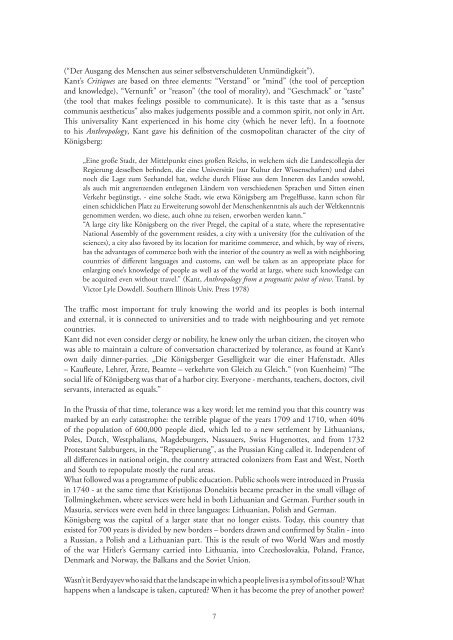BALTIC MEETINGS - Baltic Writers Council
BALTIC MEETINGS - Baltic Writers Council
BALTIC MEETINGS - Baltic Writers Council
Create successful ePaper yourself
Turn your PDF publications into a flip-book with our unique Google optimized e-Paper software.
(“Der Ausgang des Menschen aus seiner selbstverschuldeten Unmündigkeit”).<br />
Kant’s Critiques are based on three elements: “Verstand” or “mind” (the tool of perception<br />
and knowledge), “Vernunft” or “reason” (the tool of morality), and “Geschmack” or “taste”<br />
(the tool that makes feelings possible to communicate). It is this taste that as a “sensus<br />
communis aestheticus” also makes judgements possible and a common spirit, not only in Art.<br />
is universality Kant experienced in his home city (which he never left). In a footnote<br />
to his Anthropology, Kant gave his definition of the cosmopolitan character of the city of<br />
Königsberg:<br />
„Eine große Stadt, der Mittelpunkt eines großen Reichs, in welchem sich die Landescollegia der<br />
Regierung desselben befinden, die eine Universität (zur Kultur der Wissenschaften) und dabei<br />
noch die Lage zum Seehandel hat, welche durch Flüsse aus dem Inneren des Landes sowohl,<br />
als auch mit angrenzenden entlegenen Ländern von verschiedenen Sprachen und Sitten einen<br />
Verkehr begünstigt, - eine solche Stadt, wie etwa Königsberg am Pregelflusse, kann schon für<br />
einen schicklichen Platz zu Erweiterung sowohl der Menschenkenntnis als auch der Weltkenntnis<br />
genommen werden, wo diese, auch ohne zu reisen, erworben werden kann.“<br />
“A large city like Königsberg on the river Pregel, the capital of a state, where the representative<br />
National Assembly of the government resides, a city with a university (for the cultivation of the<br />
sciences), a city also favored by its location for maritime commerce, and which, by way of rivers,<br />
has the advantages of commerce both with the interior of the country as well as with neighboring<br />
countries of different languages and customs, can well be taken as an appropriate place for<br />
enlarging one’s knowledge of people as well as of the world at large, where such knowledge can<br />
be acquired even without travel.” (Kant, Anthropology from a pragmatic point of view. Transl. by<br />
Victor Lyle Dowdell. Southern Illinois Univ. Press 1978)<br />
e traffic most important for truly knowing the world and its peoples is both internal<br />
and external, it is connected to universities and to trade with neighbouring and yet remote<br />
countries.<br />
Kant did not even consider clergy or nobility, he knew only the urban citizen, the citoyen who<br />
was able to maintain a culture of conversation characterized by tolerance, as found at Kant’s<br />
own daily dinner-parties. „Die Königsberger Geselligkeit war die einer Hafenstadt. Alles<br />
– Kaufleute, Lehrer, Ärzte, Beamte – verkehrte von Gleich zu Gleich.“ (von Kuenheim) “e<br />
social life of Königsberg was that of a harbor city. Everyone - merchants, teachers, doctors, civil<br />
servants, interacted as equals.”<br />
In the Prussia of that time, tolerance was a key word: let me remind you that this country was<br />
marked by an early catastrophe: the terrible plague of the years 1709 and 1710, when 40%<br />
of the population of 600,000 people died, which led to a new settlement by Lithuanians,<br />
Poles, Dutch, Westphalians, Magdeburgers, Nassauers, Swiss Hugenottes, and from 1732<br />
Protestant Salzburgers, in the “Repeuplierung”, as the Prussian King called it. Independent of<br />
all differences in national origin, the country attracted colonizers from East and West, North<br />
and South to repopulate mostly the rural areas.<br />
What followed was a programme of public education. Public schools were introduced in Prussia<br />
in 1740 - at the same time that Kristijonas Donelaitis became preacher in the small village of<br />
Tollmingkehmen, where services were held in both Lithuanian and German. Further south in<br />
Masuria, services were even held in three languages: Lithuanian, Polish and German.<br />
Königsberg was the capital of a larger state that no longer exists. Today, this country that<br />
existed for 700 years is divided by new borders – borders drawn and confirmed by Stalin - into<br />
a Russian, a Polish and a Lithuanian part. is is the result of two World Wars and mostly<br />
of the war Hitler’s Germany carried into Lithuania, into Czechoslovakia, Poland, France,<br />
Denmark and Norway, the Balkans and the Soviet Union.<br />
Wasn’t it Berdyayev who said that the landscape in which a people lives is a symbol of its soul? What<br />
happens when a landscape is taken, captured? When it has become the prey of another power?<br />
7


